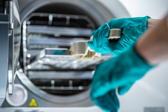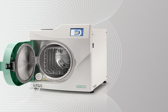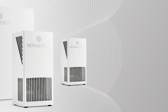Categories
Most Recent
Why clean, safe water is essential in the dental practice
8th Sep 2023 in DentalClean water is important when maintaining your decontamination equipment and preventing the spread of infection via dental unit water lines (DUWLs). All dental practices must ensure that there is sufficient protection in place to prevent pathogens from spreading via your water systems, in addition to ensuring the risk of equipment breakdowns are kept to a minimum.
The water we have access to will have undergone a comprehensive filtering process to ensure it is safe for use and consumption, but that does not mean it is totally safe. The water we use may still contain harmless microorganisms that present no risk to human health in the right conditions. However, in the wrong conditions, opportunistic pathogens can find their way into your systems and damage them.[i]
Into DUWLs
Research has found that DUWLs can be contaminated with high amounts of microorganisms,[ii] due to the patient’s oral fluids flowing back into the piping or from a contaminated water supply. Plus, the features of DUWLs can promote the growth of bacteria, which can then form biofilm.ii When the dental unit is not in use, or not maintained properly, water stagnates which then further encourages this growth. As DUWLs carry water to certain dental tools which emit aerosols, like turbines, the risk of further contamination is heightened. Some handpiece models feature an anti-retraction valve which helps to prevent fluids from going back into the handpiece.
HTM01-05 guidance states that ‘at-risk systems, particularly those used with the patient, must be drained at least at the end of each working day’.[iii] They should also be flushed ‘at the beginning and end of the session for two minutes and between patients for 20-30 seconds’ to prevent water from stagnating. Many clinicians utilise dental units that operate on self-contained water bottles: they require regular disinfection in order to reduce the risk of infection. They can be removed and flushed with distilled or reverse osmosis (RO) water with ultra-violet (UV) treatment. RO water units are a popular option in dental practices, as it is considered an effective treatment process for clean and safe water: it is also more cost-effective and energy efficient compared with the distilling process, which requires large amounts of energy in order to heat the water.i Leading RO systems will utilise UV technology to provide additional protection.
Into your decontamination equipment
It is also important to note that in areas of the UK where water is particularly hard, there is the risk of limescale build-up in your equipment, which can lead to expensive breakdowns. Limescale, which is comprised mainly of the mineral calcium carbonate, can stick to your equipment’s heating elements and interior. This could potentially block pipes, valves and reduce the reliability of the equipment. Dental practices depend on decontamination equipment such as autoclaves and washer disinfectors for sterilised instruments, and so limescale build-up can seriously threaten the efficacy of your instrument processing. Should a breakdown occur, then you could be out of pocket due to costly repairs and you may have to cancel appointments if you cannot sterilise your instruments.
In order to protect your decontamination equipment, they must be maintained with daily/weekly in-practice maintenance and then supplemented with professional care at regular intervals. To prevent minerals (like calcium carbonate) and totally dissolved solids (TDSs) from impacting the performance of your equipment, you should ensure you are effectively filtering them out, avoiding limescale build-up and therefore potential breakdowns further down the line. RO water systems utilise a thorough filtration process to ensure that your equipment is using the best quality water.
Quality protection against waterborne infection
Eschmann offers clinicians the Reverse Osmosis (RO) system for clean, safe water. This medical-
grade RO system provides you with on-demand RO water, producing more water in a shorter space of time when compared to a conventional water distiller, ideal for use in DUWLs and autoclaves. It effectively filters out minerals, TDSs, bacteria and microorganisms from your water. The unit also features WRAS-compliant backflow protection with a simple connection to a mains cold water supply. Cost-effective and with a compact design, the RO system can be bought or leased and is ideal for all dental practices.
Water can provide a perfect opportunity for infection to spread if the necessary precautions are not taken. When you invest in high-quality systems to protect against waterborne infection, you can ensure that your patients and staff are safeguarded against harm. Plus, you can reduce the risk of equipment breakdowns and extend the working life of your equipment.
Find out more here.









